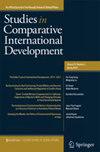民主对寿命不平等有影响吗?按性别划分的制度类型和过早死亡率
IF 1.2
2区 社会学
Q3 DEVELOPMENT STUDIES
Studies in Comparative International Development
Pub Date : 2023-10-11
DOI:10.1007/s12116-023-09407-x
引用次数: 0
摘要
过早死亡率的降低普遍归因于经济、教育和医疗因素。这项研究有助于我们理解政治因素对预防早期死亡和健康结果中的性别不平等的影响。我们分析了2000-2015年世界卫生组织生命表的数据,以估计162个国家死亡年龄分布的年度、性别特定的标准偏差。我们应用动态面板模型分析来评估政治自由化和不平等在过早死亡率之间的关系。我们的研究结果表明,在自由民主国家,过早死亡的不平等现象有所减少,男性受益的比例更高。我们的理论是,自由民主可能促使政府回应公民对改善健康和降低风险政策的愿望。随着民主自由化的发展,男性的过早死亡率下降,部分原因可能是男性受伤死亡率下降。妇女过早死亡率的降低似乎主要源于各种治疗方案中孕产妇死亡率的降低。我们的研究结果支持民主化可能带来公共健康利益的观点,尤其是对男性公民。本文章由计算机程序翻译,如有差异,请以英文原文为准。

Does Democracy Matter for Lifespan Inequalities? Regime Type and Premature Mortality by Sex
Abstract Reductions in premature mortality are widely attributed to economic, educational, and medical factors. This study contributes to our understanding of the influence of political factors in preventing early death and gender inequalities in health outcomes. We analyze data from life tables of the World Health Organization, 2000–2015, to estimate the annual, sex-specific standard deviation of the age-at-death distribution across 162 countries. We apply dynamic panel model analyses to assess the association between political liberalization and inequalities in premature mortality. Our findings show reduced inequalities in premature mortality in liberal democracies, with men benefiting disproportionately. We theorize that liberal democracy may motivate governments to respond to citizens’ desires for policies that improve health and reduce risks. As democratic liberalization increases, premature mortality falls for men, which may be accounted for in part by reduced male mortality from injuries. Reductions in premature mortality for women appear to stem primarily from improvements in maternal mortality across regime types. Our findings support the idea that democratization may provide public health benefits, especially for male citizens.
求助全文
通过发布文献求助,成功后即可免费获取论文全文。
去求助
来源期刊
CiteScore
4.40
自引率
3.70%
发文量
24
期刊介绍:
Studies in Comparative International Development (SCID) is an interdisciplinary journal that addresses issues concerning political, social, economic, and environmental change in local, national, and international contexts. Among its major emphasis are political and state institutions; the effects of a changing international economy; political-economic models of growth and distribution; and the transformation of social structure and culture.The journal has a tradition of presenting critical and innovative analytical perspectives that challenge prevailing orthodoxies. It publishes original research articles on the developing world and is open to all theoretical and methodical approaches.

 求助内容:
求助内容: 应助结果提醒方式:
应助结果提醒方式:


